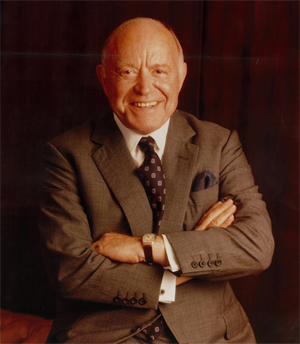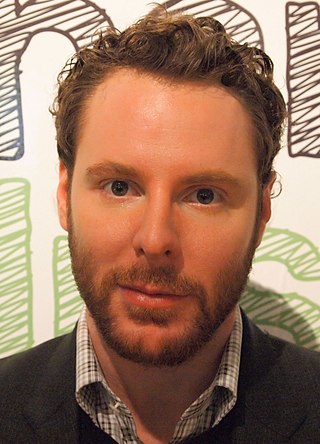
Eric Emerson Schmidt is an American businessman and former software engineer who served as the CEO of Google from 2001 to 2011 and the company's executive chairman from 2011 to 2015. He also served as the executive chairman of parent company Alphabet Inc. from 2015 to 2017, and Technical Advisor at Alphabet from 2017 to 2020. In April 2022, the Bloomberg Billionaires Index estimated his net worth to be US$25.1 billion.

John Werner Kluge was a German-American entrepreneur who became a television industry mogul in the United States. At one time he was the richest person in the U.S.

Marc Lowell Andreessen is an American businessman and software engineer. He is the co-author of Mosaic, the first widely used web browser with a graphical user interface; co-founder of Netscape; and co-founder and general partner of Silicon Valley venture capital firm Andreessen Horowitz. He co-founded and later sold the software company Opsware to Hewlett-Packard. Andreessen is also a co-founder of Ning, a company that provides a platform for social networking websites and an inductee in the World Wide Web Hall of Fame. Andreessen's net-worth is estimated at $1.7 billion. Critics of Andreessen allege he displayed a conflict of interest by effectively negotiating against Facebook shareholders.

Sotheby's is a British-founded multinational corporation with headquarters in New York City. It is one of the world's largest brokers of fine and decorative art, jewellery, and collectibles. It has 80 locations in 40 countries, and maintains a significant presence in the UK.

Evan "Ev" Clark Williams is an American billionaire technology entrepreneur. He is a co-founder of Twitter, and was its CEO from 2008 to 2010, and a member of its board from 2007 to 2019. He founded Blogger and Medium, two of the largest blogging internet platforms. In 2014, he co-founded the venture capital firm Obvious Ventures. As of February 2022, his net worth is estimated at US$2.1 billion.

Sean Parker is an American entrepreneur and philanthropist, most notable for co-founding the file-sharing computer service Napster, and serving as the first president of the social networking website Facebook. He also co-founded Plaxo, Causes, Airtime.com, and Brigade, an online platform for civic engagement. He is the founder and chairman of the Parker Foundation, which focuses on life sciences, global public health, and civic engagement. On the Forbes 2022 list of the world's billionaires, he was ranked No. 1,096 with a net worth of US$2.8 billion.

Salesforce, Inc. is an American cloud-based software company headquartered in San Francisco, California. It provides customer relationship management (CRM) software and applications focused on sales, customer service, marketing automation, e-commerce, analytics, and application development.

Gary William Flake was most recently the CTO of Search at Salesforce.com, which bought and shuttered Clipboard, Inc., of which he was the founder and CEO.

Carter's Grove, also known as Carter's Grove Plantation, is a 750-acre (300 ha) plantation located on the north shore of the James River in the Grove Community of southeastern James City County in the Virginia Peninsula area of the Hampton Roads region of Virginia in the United States.

Daniel Stewart Butterfield is a Canadian billionaire businessman, best known for co-founding the photo-sharing website Flickr and the team-messaging application Slack.

Marc Russell Benioff is an American internet entrepreneur and philanthropist. Benioff is best known as the co-founder, chairman and CEO of the software company Salesforce, as well as being the owner of Time magazine since 2018.

CNET is an American media website that publishes reviews, news, articles, blogs, podcasts, and videos on technology and consumer electronics globally. CNET originally produced content for radio and television in addition to its website before applying new media distribution methods through its internet television network, CNET Video, and its podcast and blog networks.

Minor Ventures was a venture capital firm that backs early-stage tech and media companies. The company was founded in 2005 by CNET co-founder Halsey Minor and run by Ron Palmeri from its founding until August 2010. The firm was based in San Francisco, California.

Bret Steven Taylor is an American computer programmer and entrepreneur. He is most notable for leading the team that co-created Google Maps and his tenures as the CTO of Facebook, as the chairman of Twitter, Inc.'s board of directors prior to its acquisition by Elon Musk, and as the co-CEO of Salesforce. Taylor was additionally one of the founders of FriendFeed and the creator of Quip. Since November 2023, he is chairman of OpenAI.

Automation Anywhere is an American global software company that develops robotic process automation (RPA) software.

Slack Technologies, LLC is an American software company founded in 2009 in Vancouver, British Columbia, known for its proprietary communication platform Slack. Outside its headquarters in San Francisco, California, Slack operates offices in New York City, Denver, Toronto, London, Paris, Tokyo, Dublin, Vancouver, Pune, and Melbourne.
Andreessen Horowitz is a private American venture capital firm, founded in 2009 by Marc Andreessen and Ben Horowitz. The company is headquartered in Menlo Park, California. As of April 2023, Andreessen Horowitz ranks first on the list of venture capital firms by assets under management.

Mark Suster is an American businessman and investor. He is a managing partner at Upfront Ventures, the largest venture capital firm in Los Angeles. Aside from his business career, Suster is also a prominent blogger in the American high-technology startup scene and venture capital world.
Bunchball provides a cloud-based software as a service gamification product intended to help companies improve customer loyalty and online engagement using game mechanics. Bunchball was founded by Rajat Paharia in 2005 and has raised $17.5 million in funding.
Michael Bruno is an American entrepreneur and the founder of 1stdibs, an online marketplace for antiques, furniture, jewellery, and art. He is also the founder of the home design app Housepad, Tuxedo Hudson Company and Tuxedo Hudson Realty, and Art-Design-Carta.

















